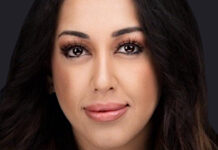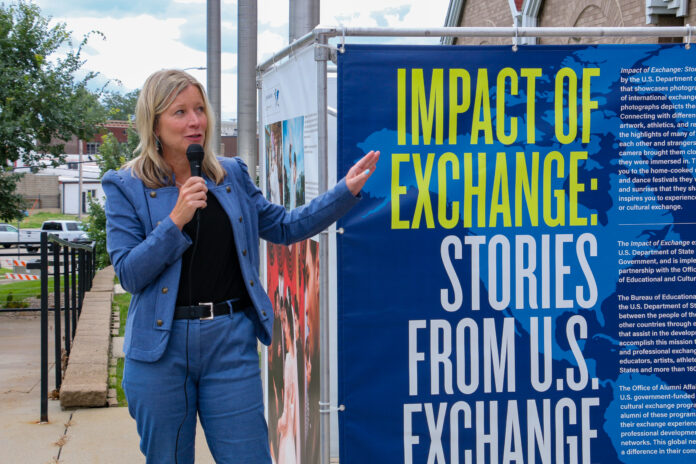
Ever since she began working with Global Ties Iowa in February 2021, Amy Alice Chastain has focused many of her efforts on raising the organization’s profile in Eastern Iowa. But ironically, after first coming to Iowa in 2016 for a teaching position at the University of Iowa, it took Ms. Chastain some time to learn […]
Want to Read More?
Get immediate, unlimited access to all subscriber content and much more.
Learn more in our subscriber FAQ.
- Unparalleled business coverage of the Iowa City / Cedar Rapids corridor.
- Immediate access to subscriber-only content on our website.
- 26 issues per year delivered digitally, in print or both.
- Support locally owned and operated journalism.
Do you want to read and share this article without a paywall?
Click here to purchase a paywall bypass linkEver since she began working with Global Ties Iowa in February 2021, Amy Alice Chastain has focused many of her efforts on raising the organization’s profile in Eastern Iowa.
But ironically, after first coming to Iowa in 2016 for a teaching position at the University of Iowa, it took Ms. Chastain some time to learn of the existence of the very program she now leads.
“I stumbled upon it, actually,” she admits.
Ms. Chastain, a longtime and enthusiastic advocate for international diplomacy, came to Eastern Iowa from previous teaching positions at universities in China and Abu Dhabi. In addition to her then-new position at Iowa, she was working on an intensive English language program with a university in one of Iowa’s sister cities in Yamanashi, Japan.
“I was digging through old agendas and calendars to plan the things that were expected,” Ms. Chastain said. “I saw something that said ‘home hospitality CIVIC,’ and I asked my assistant director at the time, ‘what is this?’ He said ‘Oh, that was something that this other organization did. You don't have to worry about it.’ I said ‘but what is it?’ And he didn't know.
“So I did what everybody does,” she added. “I Googled it. And I found the organization. I had already been here several months, and they were literally right next door. I'm looking at this website and saying ‘I think these are my people. Why didn’t I know about this?’ I emailed them immediately, just saying ‘this is who I am and this is where I come from.' They responded back, and I immediately joined their annual meeting.”
Legacy stretches back to mid-1980s
Ms. Chastain has been championing the Global Ties Iowa mission for the past three-plus years, but the organization has toiled in relative anonymity for nearly four decades.
Global Ties Iowa was founded Oct. 31, 1985 as the Council of International Visitors to Iowa Cities (CIVIC), a community organization devoted to international exchange. In 1986, the group became a full member of Global Ties U.S., which leads a network of more than 120 Global Ties organizations serving all 50 states and more than 20 countries worldwide.
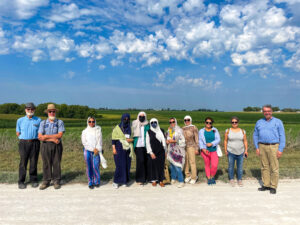
In the summer of 2022, the group emerged from two years of virtual-only programming and updated its name from CIVIC to Global Ties Iowa, and its former tagline, "Building global ties locally," was updated to "Connecting the world and the heartland."
Ms. Chastain said the rebranding came at an important time in the group’s history.
“When you hear CIVIC, for some people, it might denote some boring class in grade school,” Ms. Chastain said. “It was a big leap to go from hearing CIVIC to talking about global exchange and bringing international visitors to our community. Even though we had been here for 30-some years, people still really didn't know who we were, what we did, or that we even existed.”
For the bulk of its existence, Ms. Chastain said, Global Ties Iowa was a very Iowa City-centric organization – first with offices on campus, now working from a space at Old Brick.
However, the organization is now seeking to expand its reach with employers and hosts throughout the Corridor and Eastern Iowa.
This spring, Global Ties Iowa signed a memorandum of understanding with the National Czech & Slovak Museum & Library, including collaborations on scholarly and internship programs and grant writing, organization of co-sponsored workshops, collaborative development of programs for NCSML TV, and collaboration on conferences, symposia and seminars. The group has also opened a second office at the museum to complement its growing reach into the greater Cedar Rapids area.
The need for the second location is a practical one. Ms. Chastain said 96% of Global Ties Iowa’s international delegates end up visiting places outside Iowa City, including not only Cedar Rapids but areas such as Decorah, the Effigy Mounds National Monument near McGregor, and the Quad Cities.
“We've been really intentional about trying to truly embrace our identity as an organization for Eastern Iowa,” Ms. Chastain said.
Much of the enthusiasm for Global Ties Iowa stems directly from its staff – Ms. Chastain is the organization’s first and only full-time employee, with the balance of positions filled by college students. Many come from UI programs such as international studies, but staffers have also come from public health, law or foreign languages.
The group has also been actively trying to attract students from other local colleges, including Coe, Cornell, Mount Mercy and Kirkwood Community College.
Impact of Exchange exhibit opens; roundtable participants discuss challenges
The opening of a traveling exhibit at the National Czech & Slovak Museum & Library in Cedar Rapids’ Czech Village is providing a significant opportunity to increase exposure for international exchange programs – including the efforts of Global Ties Iowa.
The exhibit, “Impact of Exchange: Stories from U.S. Exchange Alumni,” opened Aug. 9 in Cedar Rapids – one of just five stops for the exhibit nationally – and comprises six photo-vinyl cubes, each six feet tall, featuring the photography and stories of U.S. citizen alumni of U.S. government exchange programs.
The exhibit, sponsored by Global Ties U.S., in partnership with the U.S. State Department’s Bureau of Educational and Cultural Affairs (ECA) and Photoville of New York, will remain in Cedar Rapids through Sept. 11. It’s intended to inspire local audiences to become future exchange participants – and to convey their own experiences of the power of exchange to others.
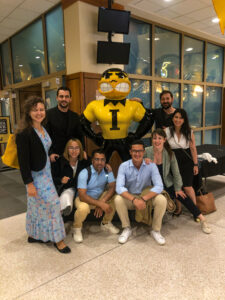
“The Impact of Exchange exhibit illustrates the transformative power of exchange programs for U.S. citizen exchange alumni, fostering both personal and professional development while forging meaningful connections across borders,” said Madelina Young-Smith, director of the U.S. Department of State’s Office of Alumni Affairs, in a statement. “The Department’s partnership with Global Ties U.S. and Iowans in Cedar Rapids provides the steppingstone to opportunities in exchange and global leadership, enriching experiences for participants at every stage of their journey, including after they return home.”
Ms. Young-Smith also participated in a roundtable discussion Aug. 9 with area stakeholders as part of the exhibit’s opening, focusing on ways to expand exchange opportunities, particularly to underserved, underrepresented or disadvantaged groups.
Participating in the roundtable virtually, Ms. Young-Smith noted that the State Department’s global exchange network is composed of more than 100 programs, including Global Ties Iowa. Overall, those programs boast 2.4 million exchange alumni, including 500,000 US citizens.
Still, she said, many demographic and cultural groups continue to be marginalized in the overall global exchange community.
“One major goal of the U.S. Department of State is to increase participation in exchange programs from states like Iowa, that are historically underrepresented in our programs,” she said. “Exchanges are your opportunity to bring Iowa and the Midwest to the world.”
Karen Wachsmuth, associate director of international fellowships at the University of Iowa, said that in the past five years or so, 25% to 30% of the UI’s recipients of Fulbright scholarships – a program that provides many global student exchange participants – are first-generation college students, minority students or members of the LGBTQ community.
“We do a lot of recruiting among those students, and among the people who serve those students on campus,” Ms. Wachsmuth said. “Getting the word out to people that this is something that they can accomplish is an ongoing task. How do we let these students from Iowa know that they can be just as competitive as people coming from New York, Massachusetts or California?”
Roundtable participants focused on ways to better work together and raise awareness of all the programs that work with international exchange students, both at the high school and college levels.
They also stressed the need to talk more about such programs on campuses and in classrooms, and to communicate more with students in the channels they use, whether through traditional marketing or social media, as part of preparing themselves for diplomatic or business careers.
“I will strongly encourage my students to come here and see these examples firsthand, hopefully get inspired, and start to think about themselves as somebody who could do these programs,” said Peter Gerlach, executive director of the Iowa Foreign Relations Council and assistant professor of international studies at the University of Iowa. “I tell students all the time that they should be preparing themselves to be the people that we talk about – for example, when we discuss international organizations, those that make these high-level decisions, maybe at the United Nations, and then to come into the museum and take advantage of learning about a part of the world – what an opportunity. It's not that they have a deficit in this area. It's that they have an opportunity now to learn so much about the world and how they can engage with it.”
Peyton Pangburn, a Fulbright English teaching assistant for the 2024-25 school year and a development intern with Global Ties Iowa, said that even as a graduate of a smaller Iowa school district, “it was commonplace to have an exchange student come here, and absolutely nobody here knew about how to go elsewhere.”
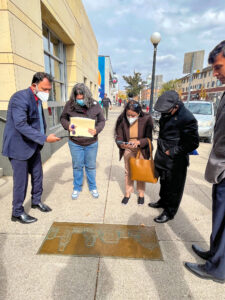
“I think that the awareness is almost nothing,” she said. “Even as somebody who was a little bit more proactive in my own education, this still wasn't something that I was aware of. My guidance counselor never brought it up. Our TAG teacher never brought it up. Our principals never brought it up. I think that communicating to them that so many of the programs that (the State Department) does really are for high school students, and that those are paid-for opportunities and available to anybody, is really crucial. To have been able to go abroad, on a lower dime, as a high schooler, would have been unbelievable. There’s lot of students in Iowa that don't go to foreign universities for whatever reason, and then if they don't go there, they never leave Iowa. They don't see the opportunity. Reaching into the rural areas, especially like northwest Iowa – that's where it really needs more visibility.”
Ms. Young-Smith also pointed out that international exchanges can dramatically impact global business fortunes.
“Bringing international students to economies around the world makes so much business sense,” she said. “In Iowa, (millions) are generated from exchange students, so it makes so much sense on a people level and an economic level.”
Other roundtable participants included Delibor Mikulas, vice president and COO of the National Czech & Slovak Museum & Library; Dawn Wood, director of global learning at Kirkwood Community College; Whitney Ozumah, associate director of international student services at Kirkwood; Christopher Merrill, director, of the University of Iowa’s International Writing Program; and Andrew Kelleher, a 2024 Benjamin A. Gilman Scholar.
Moving to the future
In 2023, Global Ties Iowa has tripled the number of projects and international leaders coming to Eastern Iowa, compared to previous years.
In total, the group hosted 37 international delegations, comprising 320 leaders and nearly 400 overall individuals, including support staffers. The delegations are housed in either local homes or hotels for their stays. Either way, Ms. Chastain said, there are ample opportunities for local residents to engage personally with the group’s visitors, from in home dinners to sightseeing excursions.
The majority of Global Ties Iowa’s funding comes from the Bureau of Educational and Cultural Affairs’ Community Partnership Grant, but Ms. Chastain said support also comes from contributions from local governments and businesses, as well as individual donations. She said the group is seeking contributions of $10,000 from at least 10 local organizations or businesses as part of a “10 for 10” campaign.
Global Ties Iowa works with several international exchange organizations, most prominently the International Visitor Leadership Program (IVLP). Launched in 1940, IVLP is a program of the Department of Cultural Affairs, and is described as the U.S. government’s flagship program to promote peace and prosperity by helping to “strengthen U.S. engagement with countries around the world and cultivate lasting relationships by connecting current and emerging foreign leaders with their American counterparts through short-term visits to the United States.”
In the last 75 years, more than 200,000 international visitors have engaged with Americans through the IVLP, including more than 335 current or former chiefs of state or heads of government.
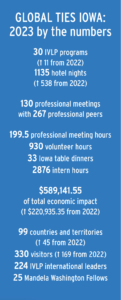 The Mandela Washington Fellowship, the flagship program of the Young African Leaders Initiative (YALI), also provides a number of Global Ties participants, and since 2016, the University of Iowa’s Tippie College of Business has partnered with Global Ties Iowa to provide orientations, cultural excursions and hospitality for Mandela Washington Fellows.
The Mandela Washington Fellowship, the flagship program of the Young African Leaders Initiative (YALI), also provides a number of Global Ties participants, and since 2016, the University of Iowa’s Tippie College of Business has partnered with Global Ties Iowa to provide orientations, cultural excursions and hospitality for Mandela Washington Fellows.
Ms Chastain said international participants in the program are identified through a meticulous selection process in their home countries.
“This is not a program you can apply for,” Ms. Chastain said. “These are people who are handpicked by people that work in our embassies or consulates all over the world for being new or emerging leaders in their specific field, and we cover almost any field you can think of.”
In essence, she said, the program serves as a form of citizen diplomacy.
“Every group has a particular, very specifically focused project,” she said. “Just over Thanksgiving, for example, we had two different projects that we called multi-regional projects, representatives from many countries in one project. One was on global economic cooperation, and the other was on advancing a safe, secure and reliable digital economy.”
Local business professionals can sign up on Global Ties Iowa’s website to work with the international groups during their stays, Ms. Chastain noted.
In terms of expansion, Ms. Chastain said she’d like to see Global Ties Iowa “continue to diversify and expand our involvement on all levels, including board and volunteer involvement.”
“I'm proud to say our board is more diverse, proportionally and representationally, than our communities as a whole,” she said. “And that's been very intentional.”
But the biggest opportunity for Global Ties Iowa’s local participants, she said, is to convey an overall sense of warmth and welcoming to the international representatives who visit under the program.
“They spend time with their peers in these communities, in our homes, sitting around our dinner tables and enjoying our cultural experiences,” she said. “And then they take all of that experience back with them.
“For many of our visitors, we might be the only smaller city that they come to,” she said. “Their other destinations might be places that they've seen in TV or movies, so they have this idea of what it's going to be like, and they see us on the list and say ‘where's that?’” she added. "But that’s the beauty for us. They have no preconceived notions of what it's going to be. That's a huge opportunity for us and for everybody that interacts with them. Because whatever we offer them, that's now what they think of Iowa. And that's beautiful.”



